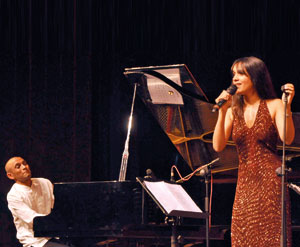He doesn’t just play the piano, he ‘talks’ to it
View(s):By Smriti Daniel
Watching Dinuk Wijeratne play the piano is like watching a man engaged in an intense conversation. He purses his lips and then pulls them back in a grimace; he shakes his head furiously then nods in complete satisfaction. Sometimes he mouths words, sometimes he stands up as if ready to pick a fight but sometimes he just smiles – and all the while, pouring out from beneath his fingers in a stream of gorgeous notes, is the music he was born to make.

Complete mastery: Dinuk at the piano accompanying Sumudu Jayatilake at last Sunday’s concert. Pic by Indika Handuwala
For a 12-year-old Dinuk, there was only one man worth listening to – Mozart was his idol and his inspiration. Having begun playing the piano at age nine, Dinuk was now really serious about writing his own music. “I was very much into classical music. I was writing third rate Mozart – he’s still my favourite composer – because you want to imitate what you love best,” he says. It didn’t win him many friends, but Dinuk didn’t care too much. “Sumudu [Jayatilaka, the vocalist who accompanied him at last Sunday’s concert at the Lionel Wendt] was saying she was the only kid who didn’t have video games, I was exactly the same. I was always playing piano and reading scores,” he says ruefully. “I was very geeky.”
It was that focus though that laid the foundations for the brilliant career that followed, one that has included a stint in New York’s Julliard School and a commission by the New Julliard Ensemble that made his concerto ‘About Sankhara’ the first work by a Sri Lankan composer to be performed at the Lincoln Centre. He would later study conducting at New York’s Mannes College of Music, has since conducted the National Arts Centre Orchestra and was appointed the Conductor in Residence of the Symphony Nova Scotia for a three year period. Numerous awards have recognised his mastery of conducting and his talent as a pianist and composer.
Among the highlights of his career as a pianist was his Carnegie Hall debut in 2004 with Yo Yo Ma and the Silk Road Ensemble. Returning for a second appearance in 2009, he played alongside tabla maestro Zakir Hussein. “He has everything that a musician needs in perfect balance,” says Dinuk of the latter, but adds that what both these iconic musicians had in common was their conviction that when it came to composing you needed to begin by thinking creatively and conceptually right at the outset. “So in a sense, you worry about technique at the very end,” says Dinuk.
Dinuk’s own compositions seem to recognise few restraints. It’s extraordinary to watch him simply reach under the hood of his grand piano and manipulate the strings directly, playing them like a guitar, pausing occasionally to create a deep percussion by thumping on the side of the instrument. In Tsimo! he samples percussion loops, quotes ancient Persian poetry from the Ruba’iyat, makes room for an African choir, imitates the frantic beats of the tabla, and contrasts them with the strains of a Schubert string quartet….and then finds room for Sherlock Holmes.
Voraciously curious, indefatigably adventurous, Dinuk is an artist who appears to be constantly challenging himself. He might have started out on a diet of the classical masters, but he has long since paddled into lesser known waters – weaving in electronic music and multi-media presentations, dabbling in the Middle Eastern and Indian classical traditions, and more recently becoming absorbed in the unusual music that comes out of the Indonesian island of Bali.
This spirit is represented in his first album, ‘Complex Stories, Simple Sounds’, released in 2008 in collaboration with close friend Kinan Azmeh, arguably among the finest clarinetists around. “He and I connected first through the Middle Eastern music that was embedded in my brain,” says Dinuk, adding that they layered on a mutual interest in the Hungarian composer Béla Bartók. “It was this crazy mix of our passions.”
Much of his continuing sense of artistic freedom is rooted in his decision to become a freelance musician, made four years ago. “Writing wise, I’m very grateful I’ve got commissions that will take me until 2014 but it’s up to me to satisfy myself that I’m playing enough, that I’m practising enough.”
Left to his own devices, Dinuk’s work calendar has its own, almost seasonal rhythm. In the summers he stays at home in Halifax, practising and playing, and going for leisurely swims in the lake near his house. “In summer the phone doesn’t ring, because it’s out of season for musicians.” The concert season arrives in September and stretches into May, bringing with it a round of travelling. In between he finds time to teach, another passion – “I couldn’t do without it. The most you learn from education is what you learn from your students.” He currently lectures at the universities of Dalhousie and Acadia.
Today, Dinuk keeps a fine balance between his love of performance, his desire to teach, his need to compose and the pleasure he finds in conducting. He’s cut down the number of concerts he conducts to 12 a year since he accepted that having the heart of a composer meant he liked to create his own work instead of focusing on realising someone else’s. He’s opting instead for the deep, satisfying pleasure of watching his compositions brought alive by skilled musicians. (He’s currently working on a 25 minute long percussion concerto for 60 players.) “It’s always surprising but it’s never been disappointing,” he says of hearing his pieces played. Comparing the process to a director casting his film, he emphasises the need to collaborate with artists you trust. “I like to choose people because I know they’ll bring something interesting to it.”
Follow @timesonlinelk
comments powered by Disqus

















